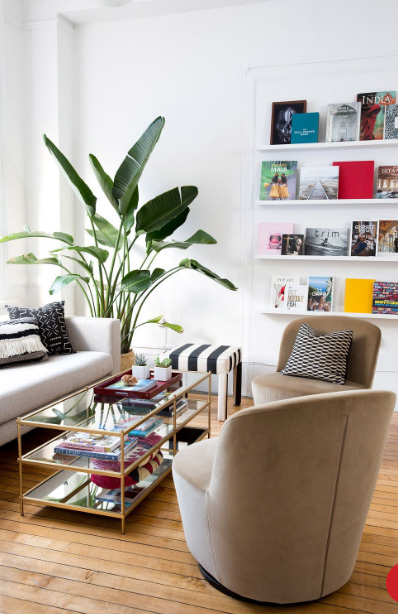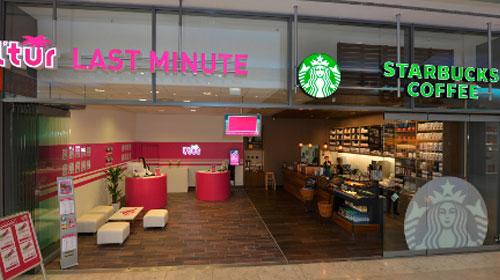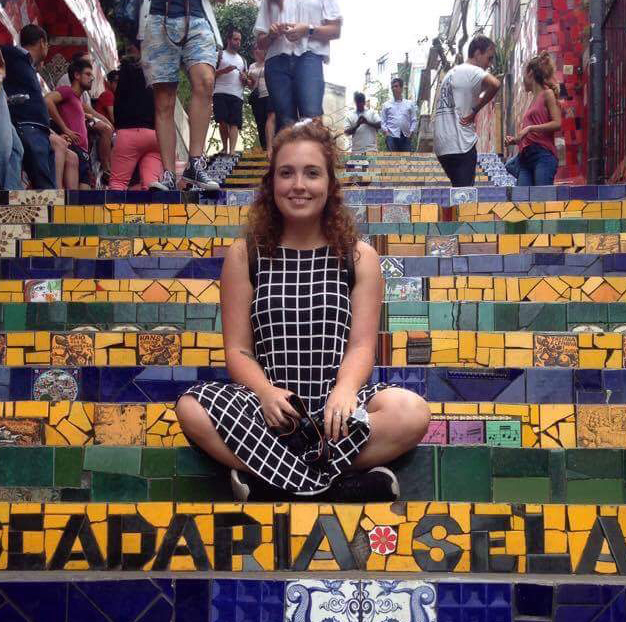How to future-proof your travel agency

When everything seems to be going digital and brick and mortar stores grow increasingly out of fashion, it can be a bit worrying for real world travel agencies.
But there’s still hope yet – as long as you have the right tricks up your sleeve to keep travel stores in fashion, says US travel site, Skift.
There are a whole stack of travel agencies around the world who have shaken things up in order to stay relevant for consumers. You can forget the traditional desks and meeting chairs; if you want your agency to survive the digital disruption, take a leaf out of these guys’ books!
The Local Foreigner

Owned by four millennial women, this chic New York – Soho to be exact – agency is anything but ordinary.
This travel agency is a collaborative workplace, writes Skift, where consultations take place in a cosy living space with couches and creativity.
Calling themselves “trusted tastemakers”, the agents in The Local Foreigner “curate authentic experiences” and “connect discerning travellers with passionate locals”.
They also have a four-step process to forging long-lasting client relationships, including having conversations about what kind of traveller someone is; play matchmaker to your ideal holiday; sketch outlines of a trip; and “shade and colour in” the details.
L’Tur

Per Skift, over in Germany, the Baden-Baden branch of L’Tur – which happens to be one of Germany’s largest agency groups – does things a little differently.
Think about what you want most when headed into a meeting, or better yet, a fab chat about your next adventure? Coffee.
L’Tur shares its retail space with Starbucks in an upscale mall, meaning since 2012. Genius.
Departure Lounge

Perhaps one of the greatest pieces of advice for sustaining travel agency stores comes out of Departure Lounge in Austin, Texas, and its owner Keith Waldon.
According to Skift, Waldon opened his hybrid travel agency/coffee bar/wine bar in a cool downtown space, after researching where people most often chitchat about travel.
Waldon told the travel publication that his survey showed most people get excited and inspired about travel in social environments, such as nights out in a bar with their friends.
So Departure Lounge got rid of the desks, computers and “blocking mechanisms,” as Waldon called them, and opened up a space where agents and travellers could comfortably mingle over organic coffees, small-batch boutique wines, artisan chocolates and cheeses.
They include large touchscreens to showcase travel destinations and invite independent travel advisors to come into the space to consult with clients, while also hosting travel-related events in the plush space.
Departure Lounge is now taking off into a franchise model. The prototype franchise will open at Austin’s airport in summer 2017 and Waldon expects other branches should be open by early 2018.
While these spin-offs won’t come with a public bar like the original agency, all clients will be offered free beverage menus, while the spaces will keep that upscale lounge vibe.
And it’s working; Waldon claims his unique business model sees conversion rates for agents who meet their clients in-person at The Departure Lounge is a huge 83 percent.
Travel Design Lounge
This fresh take on a travel agency offers booze, coffee, food and experiential travel evenings (such as Italian Wine Night), similar to Departure Lounge, although plans on keeping things in-house rather than starting up franchises.
According to Skift, Jeff Cain, senior vice president of the company’s specialty divisions, said, “We are continuing to fine-tune the concept in the prototype location in Omaha, Nebraska (which opened at the end of 2015) before going on to target major cities.”
Travel Design Lounge has full-time agents working in the space, but Cain told Skift “while travel is definitely the biggest revenue driver, we do derive profits from our food and beverage sales and space rental”.
Future of Virtual Reality:
China’s luxury lifestyle travel platform, Zanadu, opened its ‘Travel Experience Space’ in Shanghai, offering customers 360-degree virtual reality experiences and other high-tech fun stuff to get people excited about travel.
Meanwhile, Flight Centre Singapore is another heavyweight getting serious about bringing VR to brick and mortar stores.
Thomas Cook UK is midway through its rollout of a new Discovery store concept, while a number of US agencies are trialling VR programs with luxe headsets like the Oculus Rift.
Skift predicts that once this becomes “the norm”, it won’t take long for agencies to offer “virtual reality rooms” where clients can explore destinations virtually before booking.
Email the Travel Weekly team at traveldesk@travelweekly.com.au
-
Latest comments
Latest News

Princess Cruises unveils Sanctuary Collection, Star Princess to sail Alaska in 2026
From the sunny port of Barcelona, the Sun Princess welcomed worldwide media aboard for an update on what’s new and what’s next for Princess Cruises today, 23 April. The setting also doubled as the official naming ceremony for Princess’ first sphere class ship which was live streamed around the ship for all guests to enjoy. […]

Collette special offers across peak northern summer season
Global tour operator Collette has announced a series of special offers on selected dates across a range of tours in the peak northern hemisphere 2024 summer season. Greece The offers include ‘Greece & Its Islands’ features classics such as the Parthenon as well as the picturesque islands of Mykonos and Santorini. A saving of $700 […]

Air India and All Nippon codeshare between the two countries
Air India and All Nippon Airways have signed a codeshare agreement connecting their networks. The new commercial partnership will provide more travel opportunities for customers of both India’s leading global airline and the largest Japan’s largest carrier. Effective from 23rd May, the Air India and All Nippon Airways agreement will see passengers fly to their […]

A&K offers minimum 18 weeks paid parental leave
A&K Travel Group will now provide a minimum of 18 weeks paid parental leave for both care-givers, setting a new standard for the travel industry. By providing 18 weeks of paid time off for all new parents, regardless of gender, A&K Travel Group is not only enabling parents to spend valuable time with their newborns […]

NH Hotel Group rebrands as Minor Hotels Europe & Americas
Hang around the bends of the hotels. We imagine they will be full of a lot of branded content.

Scenic Eclipse II – the business of creating unforgettable life-changing memories
These cruise brothers from another mother offer a view of cruising on Scenic Eclipse II that is poles apart.

MSC builds new hospital ship with Mercy Ships
If you want to read a story that puts a smile on your face then this is the one for you.

“I peed on myself watching this” – Social media users squirm at Royal Caribbean’s Harmony of The Seas 55ft dive video
TW is not responsible for any involuntary actions your body might have after watching this video.

FLIGHT REVIEW: Qantas Boeing 787 Dreamliner business class
The real bonus is you're unlikely to be around screaming children. Hoorah!

Traveltek offers travel agents new rapid deploy cruise website
As always, if you have any issue with the platform, just turn it off and on again.

Experience whale watching & classical music at the Australian Festival of Chamber Music in Townsville
Disappointedly, the whales do not start singing in tune with the orchestra. Opportunity missed.

Fond, very Fond. London hotel famed for James Bond link adds ‘Classic Comforts’ lunch menu
James Bond author Ian Fleming was so fond if this hotel, it inspired the legendary phrase ‘shaken, not stirred’.

What sets Eclipse Travel apart with Africa expert Hilary Dubyk: Travel Weekly TV
If you want to know more about Africa, then Hilary Dubyk is your person.

Surge in Australians visiting Japan
Feel like all of your friends have just returned from Europe? Now it's Japan.

Seabourn announces Western Kimberley Traditional Owners as Godparents of Seabourn Pursuit
Seabourn has named Western Kimberley Traditional Owners, the Wunambal Gaambera, as Godparents of the ultra-luxury purpose-built Seabourn Pursuit. It is the first cruise line to appoint Traditional Owners as godparents of a ship. Seabourn Pursuit embarks on its inaugural season in the Kimberley region this June. The naming ceremony will take place on Seabourn Pursuit’s […]

Sydney named 17th best place to work remotely
If you struggle to get a seat within Sydney's coffee shops, you now know why.

W Melbourne grows sales team
We appreciate the thought that has gone into this team photo.

Cunard welcomes new ship Queen Anne
This might be the most impressive ship handover in ship handover history.

Intrepid Travel appoints Yvette Thompson as general manager sales & marketing ANZ
It isn't end-of-day Monday and Yvette Thompson has already nabbed herself an impressive promotion.

Anna Fawcett re-joins Global Touring in newly-created APAC role
With such an impressive CV, Global Touring is no doubt thrilled to have Fawcett back.

“We know our response has been far from perfect” – Emirates’ open letter following Dubai flooding
If you also need to write an apology letter, then this is a pretty good template.

Malolo Island Resort opens brand new Spa
Fiji’s Malolo Island has added another string to its bow – opening its $1.3 million day spa on Thursday, 18th April 2024. (Lead Image: matriarch Rosie Whitton with spa staff) Located at the edge of the resort’s luscious patch of tropical rainforest, the new “Leilani’s Spa” adds another level of elevated experiences to Malolo’s already […]

Virgin Australia’s HILARIOUS second instalment of the ‘Bring on Wonderful’ campaign
We don't use the word 'hilarious' lightly, but this is worthy of the title.

Visit Sunshine Coast reveals new brand identity
If you were looking for another reason to visit the Sunshine Coast then this is it.

Sofitel launches brand campaign starring Sex Education’s Gillian Anderson
We can confirm the content of this video is less spicy than Sex Education.

Holland America Line gives agents the chance to visit Alaska on 11-day Famil
If you've ever wanted to see a Polar Bear (and who doesn't?), now is your time.

More than 65 luxury agents gather in Sydney for Best of the Best dinner
This looks like a fabulous do. We imagine there may be a few (or maybe 65) sore heads this morning!

Globally-renowned chefs gather for Vivid Food 2024
As a human, we agree that food is a fundamental part of the human experience. Some might say the most fundamental.

Air New Zealand returns to Hobart and Seoul
If you notice an uptick in Kiwis making their way through the Mona, you know why.

European Waterways targets multi-generational families with ‘floating villa’ deal
The jury is still out on whether spending a week on a 'floating villa' with family is a hell or a paradise.

Luxury Escapes launches ‘sail away’ sale
Rest assured, you'll be getting your 'sails' and 'sales' mixed up for the rest of the day.

Rex-owned National Jet Express adds weekly charter between Brisbane and Orange
This is for mining and civil contractors, so please, put your holiday attire away.

Let the games begin. Viking introduces eye-watering benefits for the industry’s top 10 advisors
Did someone say 'trip to Venice'? Hold my coat, this one is far too good to miss!

Best friends or frenemies? What is the REAL relationship between sales and marketing?
We can all stop fighting over the corner office because our mothers were right - we are all important in our own way.

The Walshe Group Announces Two Key Appointments
What we really want to know is whether they got joint or separate welcome parties.

FAMIL: Agents explore the delights of Mauritius on 7-day tour
Go green with envy as you read this fabulous itinerary! Time to book that second honeymoon.

Thanks for sharing these wonderful posts.these are very informative.
http://tourista.asia